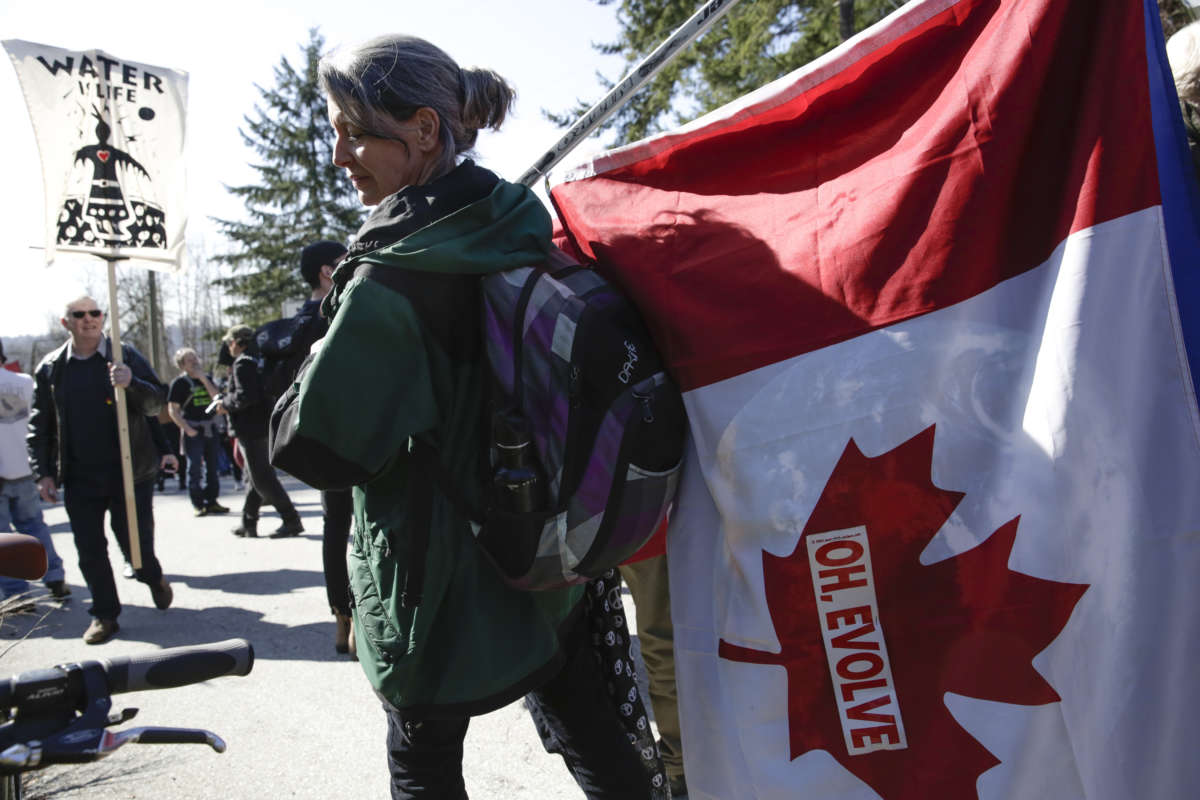Every morning, I walk along the waters of the Salish Sea on the Kitsap Peninsula in Washington State. Most days I am lucky enough to see the pink of the sunrise over Mount Rainier. This spring, millions of tiny herring eggs covered the beach, bringing with them a riotous cacophony of sound, including sea lions barking into the dead of night.
This place is the very heart of me. This coast is the solace that I seek when I am overwhelmed by the pandemic, by the everlasting wars, and the twisting fear of the climate emergency.
Today, the shores are smoky from fires raging across North America. I can’t see the mountains because of the smoke. The Salish Sea is threatened by the expansion of the single largest industrial project on the planet, the largest growing source of greenhouse gas emissions in North America: the Alberta tar sands. The Trans Mountain pipeline is slated to increase tanker traffic carrying 890,000 barrels of crude oil through this region, and the risk of an oil spill is significant.
We are fighting climate disruption that sets our homes on fire and covers us in a blanket of smoke for entire seasons. Smoke is putting my best friends and family members’ lives at risk because of severe asthma, compounding lung damage from COVID, and other health impacts. The herring, sea lions, and all the life I see on my daily walks are at risk too; thousands of sea creatures died in the last heat wave.
Over the better part of the last decade, communities have been giving their all to resist the pipeline that puts this place at risk. Indigenous people resist the pipeline on their territory because it destroys the sacred: grave sites, creation sites and drinking water.
Indigenous Secwepemc Land Defenders known as the Tiny House Warriors are providing solar-powered housing for their community members and asserting sovereignty through living in a tiny house village along the pipeline route on Secwepemc land. Tsleil-Waututh members and Coast Salish relatives, Mountain Protectors and allies continue to assert their laws at the Watch House, kwewkweknewtx, a grassroots coalition of activists who have constructed a traditional Coast Salish structure along a pipeline easement to assert Indigenous rights and keep a watchful eye on the pipeline and storage tanks in Burnaby, Canada.
As a thanks for the stewardship of their own land, these communities are being criminalized with constant state surveillance and increasing violence from police. Every time they try to silence us, our movement to stop this pipeline and all tar sands expansion projects grows. We will not stop fighting.
There is another group beyond governments and corporations that make this destruction possible: insurance companies. You might not think of insurers at first, but everything is insured: vehicles, your health, and even the Trans Mountain pipeline — a toxic, 68-year-old leaking pipeline and its related expansion.
Over the last five years, 26 of the world’s major insurance companies have limited their coverage for coal, and 10 for tar sands. Lloyd’s of London, an insurance giant, has committed to backing out of the tar sands sector at the end of last year. Recently, another insurance company ruled out coverage for Trans Mountain — the 15th in a wave of companies exiting the project.
Now, the pipeline company, Trans Mountain Pipeline LP, is petitioning the Canadian federal government to keep its remaining insurers secret. (The Canadian government stepped in to buy the pipeline company in 2018 from its previous owner, Kinder Morgan Inc., for $3.6 billion.)
The company is desperate to keep those insurers under wraps because they are increasingly responding to growing pressure from youth organizing direct actions at insurance offices and hundreds of thousands calling them out through petitions. During a week of action on Trans Mountain insurance, there were over 25 protests around the world, in countries as far away from the project as Uganda.
One of the companies backing Trans Mountain, Chubb, was the first North American insurer to rule out coal. Chubb’s policy ruling out coal reflected their “commitment to do our part as a steward of the Earth,” according to CEO Evan Greenberg. Yet, according to Reuters, Canadian regulatory filings showed Chubb increased the coverage it provides for Trans Mountain for its 2019/2020 certificate to $200 million. The company remains a top oil and gas insurer.
Greenberg and the insurers covering Trans Mountain know better than most the cost of climate chaos on communities by the numbers: Insurers are facing costs for major oil spill as well as the costs associated with climate change; industry losses from natural disasters were $83 billion in 2020. Yet, these insurers are continuing to invest in and underwrite fossil fuels, making multimillion-dollar deals to support the status quo.
As I walk along these shorelines, considering the impacts of this pipeline on all that I hold dear, corporate insurance boardrooms making multimillion-dollar deals are far away from the real impacts on communities, on the land and on these waters. The risks to this pipeline and supertanker project far outweigh its benefits — and CEOs like Greenberg are profiting off of the theft of this land and the destruction of this water while we watch it go up in smoke.
Join us in defending the truth before it’s too late
The future of independent journalism is uncertain, and the consequences of losing it are too grave to ignore. To ensure Truthout remains safe, strong, and free, we need to raise $46,000 in the next 7 days. Every dollar raised goes directly toward the costs of producing news you can trust.
Please give what you can — because by supporting us with a tax-deductible donation, you’re not just preserving a source of news, you’re helping to safeguard what’s left of our democracy.
